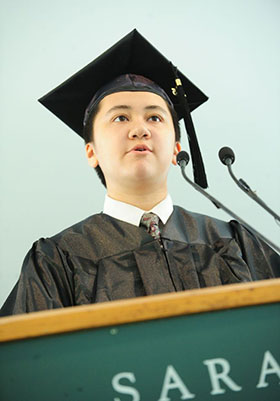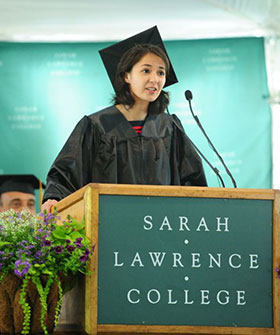Emily Lim Rogers '15
 I would tell us, “We’ve made it,” but it strikes me as something very contrary to the sensibilities of educational philosopher John Dewey, on whose principles our curriculum was founded. For Dewey, education was about practice, process. Education didn’t really ever end. The walls between the institution and society outside of it were ever-permeable. And if education were to be “preparation” for anything rather than an end in itself, it would be to prepare for a democratic society. In four years at Sarah Lawrence, we have come to realize that our work is actually far from over, and it is precisely this fact that we gather here today to celebrate.
I would tell us, “We’ve made it,” but it strikes me as something very contrary to the sensibilities of educational philosopher John Dewey, on whose principles our curriculum was founded. For Dewey, education was about practice, process. Education didn’t really ever end. The walls between the institution and society outside of it were ever-permeable. And if education were to be “preparation” for anything rather than an end in itself, it would be to prepare for a democratic society. In four years at Sarah Lawrence, we have come to realize that our work is actually far from over, and it is precisely this fact that we gather here today to celebrate.
Two weeks after we began settling into our dorm rooms in September of 2011, the Occupy Wall Street Movement began to settle in Zuccotti Park. Today, we end our time here in May 2015, when, as we speak, Black Lives Matter protests are going on all over the country. Both are movements that raise core questions about the fate of American democracy today. And these are fascinating times in which to go to College. But when Wall Street gets bailouts and black men and women get senselessly murdered, often at the hands of law enforcement, these are dark times for our country. The American people are increasingly questioning the fact that the ideal of democracy seems so far from how it is actually practiced.
At our own school, we realized that we did not exist in a bubble. We knew we could not create walls between ourselves and the larger society. Just this year, a brave group of students demanded we confront racism in our community. Another group asked us to reflect on the role of money in our institution.
And still, there are people who may say our education has been impractical. But Dewey was the ultimate pragmatist: education and society, viewed together. The definition of “practicality” today too often merely means to reinforce the status quo—and to earn a pretty penny while doing so. But why should this be the only definition?
In a time of apathy, we see that the status quo is unsustainable. What better practical education than the knowledge that we must go out and change it? We have practiced our education here: we have debated around seminar roundtables, we have sat with professors for far too long in conference, we have discussed our essays with friends in the library (sometimes instead of writing them), and we have had deeply intellectual late-night conversations outside the Pub. This is education in practice, this is a practical education—when we take knowledge and put it into our own terms, apply it to our own surroundings, integrate it into the everyday, not just exam day. (And thankfully, we don’t value exams too much.)
Based on the principles of John Dewey, what we gained here at Sarah Lawrence could also be called a living knowledge. Antonio Gramsci, imprisoned under Mussolini’s regime, saw education as a way to change society. He wrote, “This was the most living part of studying: this spirit of re-creation, which enabled encyclopedic items of information to be assimilated and fused them into a flame burning with new individual life.”
We know what this spirit of re-creation is like. We’ve all written conference papers, whose very essence is to take what is considered settled and turn it into something new. (The worst trait of any conference paper is that is unoriginal, and I for one have had many an existential crisis wondering this of my own projects.) I want to stress to you, that we have had the privilege of acquiring a living knowledge. We must not let it be stifled out by the market mentality that says the only things worth knowing are the things that are immediately valuable in monetary terms. The progressive tradition started by Dewey, which holds that education for democracy must also be democratic in its methods, must endure here at Sarah Lawrence, just as we must apply its principles to what we do outside of it.
Today, on graduation, we celebrate what we have already created and re-created, and we mark our passage into another chapter. It’s now time to take the “facts” of our society as we know it, to take inventory of our present condition, and to reimagine, re-create, our world. While you may never want to hear the words “conference paper” ever again, I hope you retain the instincts that you gained from writing them. In these times of darkness for our society, may the flames we have started here at Sarah Lawrence continue to burn with life beyond this institution! I believe in Sarah Lawrence, I believe in the Class of 2015, and I know that we will not content ourselves with traditional notions of success and finality; we will not say we have made it, but rather we commemorate today the knowledge that we are perpetually in process, that we are making it. Thank you.
Stephanie Emi Permut '15
 In 1990, Dr. Seuss published a now very famous Children’s book titled “Oh The Places You Will Go." Seuss’s story follows the journey of an unnamed protagonist, whose vague travels through a cartoonishly polychromatic landscape share convenient similarities to graduations, bat mitzvahs, and, frankly, most important life decisions. This speech is not about that book. Thankfully. In fact, it was initially conceived as a challenge to the Seussian refrain that the right answers and Great Places are always accessible to 21 and 22 year olds. Instead, I’m going to depart from the usual self-certainty of graduation speeches, and talk about our lack of assuredness as soon-to-be college graduates. More specifically, I’ll advance the controversial position that we should find comfort in this uncertainty. In the unlikely event that there is a Random House representative in the audience who is just rushing to publish a graduation speech anthology, the working title of this address is “I’m Confused, You’re Confused, and That’s Ok.”
In 1990, Dr. Seuss published a now very famous Children’s book titled “Oh The Places You Will Go." Seuss’s story follows the journey of an unnamed protagonist, whose vague travels through a cartoonishly polychromatic landscape share convenient similarities to graduations, bat mitzvahs, and, frankly, most important life decisions. This speech is not about that book. Thankfully. In fact, it was initially conceived as a challenge to the Seussian refrain that the right answers and Great Places are always accessible to 21 and 22 year olds. Instead, I’m going to depart from the usual self-certainty of graduation speeches, and talk about our lack of assuredness as soon-to-be college graduates. More specifically, I’ll advance the controversial position that we should find comfort in this uncertainty. In the unlikely event that there is a Random House representative in the audience who is just rushing to publish a graduation speech anthology, the working title of this address is “I’m Confused, You’re Confused, and That’s Ok.”
When I first walked into Hill House with the confidence of someone who believes they know a lot about the world, but really, egregiously doesn’t, I thought “four years from now I’m gonna have it all figured out.” Well it’s been four years, and I can safely say that I don’t (truth be told, I may have even regressed in my world-understanding). That’s ok. If you’re leaving here today not knowing what you’re doing next week or in several weeks or even in several months, realize that that is ok, too. Sometimes, it’s important to divest ourselves from the idea that certainty is the cornerstone of all success or self-actualization. Sometimes, it’s ok to feel unsure.
At some point in the time between that misguided first-year assertion and now, I came to an important realization: comfort—with your position in the world, your beliefs, yourself—is often inversely proportional to how much you actually know. Social psychologists call this the Dunning Kruger Effect. Put simply, people tend to overestimate their abilities in unfamiliar domains. In even simpler terms, the more a person knows, the more they know that there is a lot they don’t know. This shouldn’t be discouraging; rather, I think it realistically frames an important aspect of maturity and academic growth. It is, moreover, what allows individuals to see criticality as care or intellectual collaboration, and not, rather, as aspersion. Many of us will enter the Real World feeling less than sure of ourselves. I am absolutely contending with these feelings (something that anyone who’s interacted with me recently can certainly corroborate). And that’s ok.
One must recognize that this uncertainty arises from a significant inner-place of self-reflexiveness. We have spent the past four years immersed in an incredibly rich intellectual environment. Personally, I have gone from knowing almost nothing about the world to knowing at least enough about it to consistently reflect upon the firmness of my convictions. In a global intellectual landscape that increasingly demands assuredness, or even worse dogmatism, from its inhabitants, accepting that people often don’t know is crucial. This is why we, as Sarah Lawrence graduates, make such useful critical thinkers; we are comfortable enough in our uncertainty to pursue our projects in a truly empathetic, holistic, and self-aware fashion.
As I (very nervously) look around at all of you, I can’t help but want to curl up into the fetal position, but also to feel grateful to belong to a cohort that is so engaged and so comfortable questioning. You may sit there feeling uncertain about your universes and the stability of your locations within it—or maybe not, maybe it’s just me—but even that line of thinking suggests that your time at this institution was time well spent. So, keep learning and keep feeling uncertain, but most importantly, make sure that you are comfortable while doing so. You are only going to learn more and the world is only going to become more complex. It’s ok to feel unsure. We all do, and we are all slightly more responsible thinkers because of it. Remember, “I’m confused, you’re confused, and that’s ok!” Thanks, and best of luck, Class of 2015.